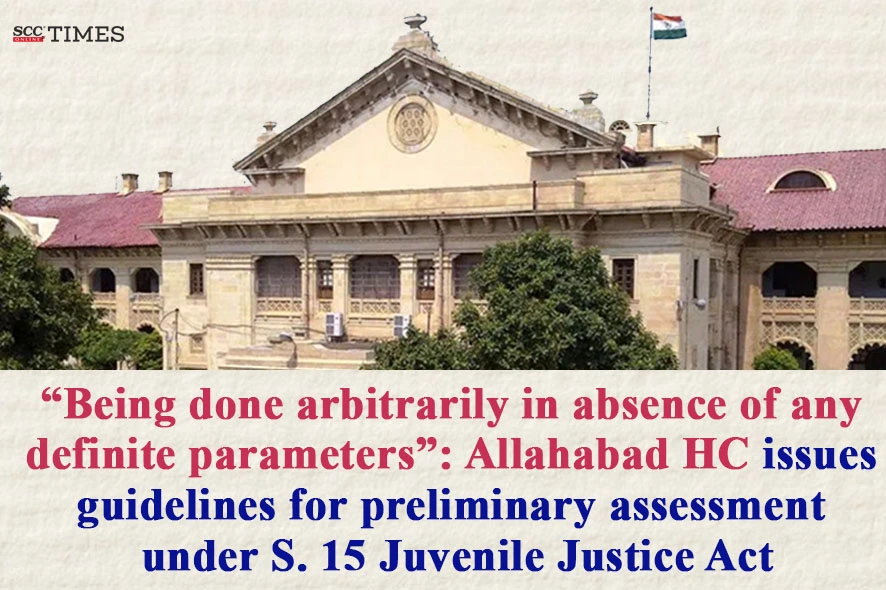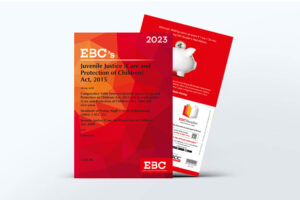Allahabad High Court: In a revision petition filed seeking quashing of orders passed by the Children’s Court and Juvenile Justice Board (‘the Board’) wherein the petitioner minor was held to be tried as an adult, the Single Judge Bench of Siddharth, J., allowed the petition, holding that the impugned orders were not in accordance with law. Hence, the preliminary assessment of the petitioner had to be conducted anew by the Board in accordance with the provided guidelines.
Background
An FIR was filed under Sections 147, 148, 149, 323, 302, and 120-B of the Penal Code, 1860, wherein the petitioner was not named, yet implicated.
The Board, after determining the age of the petitioner as 17 years, 6 months, and 27 days, directed his preliminary assessment as per Section 15 of the Juvenile Justice (Care and Protection of Children) Act, 2015 (‘JJ Act’). Before the Board, he was asked some questions, and it was held that he was capable of understanding the consequences of murder and other offences committed by him and thus, he was sufficiently mature. He was also found to be implicated in two earlier offences. Thus, he was held liable to be tried as an adult by the Board vide the impugned order.
Aggrieved, the petitioner filed an appeal before the Children’s Court, but his appeal was dismissed vide the impugned order, though the psychologist’s report stated that the petitioner seemed to be immature and did not know the consequences of his actions.
Hence, the present revision.
Analysis
At the outset, the Court noted that Section 15(1) of the JJ Act was absolutely vague because although it provided for preliminary assessment of the child in conflict with law with the help of psychologists, psycho-social workers, or other experts, it did not mention the process of determination. Further, upon perusal of Rule 10A and 11(2) of the Juvenile Justice (Care and Protection of Children) Model Rules, 2016 (‘the Rules’), the Court found that there was no mention as to how the preliminary assessment of a child should be made by psychologists to help the Board/Court.
The Court found that although the Board had taken the assistance of psychology experts for conducting a preliminary assessment of the petitioner for his trial, it did not seem reliable.
In this regard, the Court relied on Barun Chandra Thakur v. Bholu, (2023) 12 SCC 401, wherein the Court observed that intense emotion was likely to affect the cognitive maturation, the child with average IQ will have intellectual knowledge of the consequences of his action, but whether he will be able to control himself or his actions will depend on his level of emotional competence.
The Court stated that Emotional Intelligence Quotient or EQ is the ability to understand, use, and manage emotions in positive ways to relieve stress, communicate effectively, empathize with others, overcome challenges, and defuse conflict. Poor EQ is linked to crime and other unethical behaviors. Children who have poor emotional skills become social outcasts at a very young age, become the class bully, or react with fists rather than with reason. The path to crime starts early in life, while there is no doubt that family and environment are strong contributors, the common threat is poor emotional and social skills.
The Court further relied on Barun Chandra Thakur (supra), wherein the Court expressed the need to formulate the guidelines to assist the Board in making a preliminary assessment under Section 15 of the JJ Act. The assessment of adolescent mental capacity and ability to understand the consequences of the offence of the child in conflict with the law is one of the most crucial determinants of the preliminary assessment. This evaluation of ‘mental capacity and ability to understand the consequences’ of the child cannot be relegated to the status of a perfunctory and routine task, as the fate of the child precariously rested on it. The Supreme Court also directed that the expression “may” in the proviso to Section 15(1) would be mandatory, and the Board would be obliged to take the assistance of an experienced psychologist, psycho-social worker, or another expert. In a case where the Board consists of one member, who is a practicing professional with a degree in child psychology or child psychiatry, and chooses not to take such assistance, the member shall record specific reasons thereof.
The Supreme Court further noted that there were no guidelines or framework to facilitate the Board in making a proper assessment under Section 15. The type of tests required by the assessment of a child in conflict with the law by the psychologist has not been defined anywhere in the Act. The guidelines of the National Commission for Protection of Child Rights (NCPCR), issued in 2023, were also of no help in this regard.
The Court noted that there had been several orders of preliminary assessment wherein the psychologist’s report did not state anything on the nature of the test conducted for preliminary assessment of the child. Further, Social Investigation Report and Social Background Report were seldom mentioned in the preliminary assessment order passed by the Board or Children’s Court.
Upon perusal of the impugned order of the Board and the psychologist’s report, the Court stated that the Board did not consider the psychologist’s report while passing the order. However, the Appellate Court considered the same and recorded that the petitioner was immature and unable to understand the consequences of his actions.
The Court held that the psychologist’s report of such nature does not fulfil the requirements of Section 15. The report did not record any findings regarding what kind of test the petitioner was subjected to or what his EQ or IQ was. However, the Board recorded that he had criminal antecedents of implication in two cases. The Court held that these antecedents could not be the sole ground for declaring him an adult for trial.
“It appears that, only to make formal compliance of getting a report from a psychologist, the report was called.”
Furthermore, the Court remarked that it had come across cases where the Board and the Children’s Court did not find any psychologist within their jurisdiction, so they decided the issue of preliminary assessment on the mere questioning of the child.
The Court found that many of these issues had been addressed by the NCPCR Guidelines, and the Supreme Court had urged the Union and other authorities to consider issuing guidelines or directions that may assist and facilitate the Board in making the preliminary assessment, but nothing had been done as of yet.
“The issue of preliminary assessments is a delicate and difficult task which requires expertise. As of now, it is being done in an arbitrary manner in the absence of any definite parameters/ guidelines for the same.”
Thus, the Court issued the following guidelines till the legislature formulates appropriate guidelines:
-
The Board will necessarily call the report of a psychologist regarding the test of intelligence of a child conducted regarding his ability to understand the consequences of his act, like the Binet Kamat Test of Intelligence, Vineland Social Maturity Scale, Bhatiya Battery Test of Intelligence, or any other test. The psychologist will indicate in his report clearly what test was performed for assessing the mental ability and intelligence of the child to ascertain whether he is required to be tried as an adult, who has committed a heinous offence. The EQ and IQ of such a child shall also be clearly indicated in the report of the psychologist.
-
A clear finding shall be recorded regarding the child’s physical and mental capability to commit the heinous crime alleged and his ability to understand its consequences;
-
The Board shall direct the Probation Officer, or in case a Probation Officer is not available, the Child Welfare Officer(‘CWO’) or a social worker, to undertake social investigation into the case and submit a social investigation report, within a period of fifteen days from the date of first production of child before the Board [Section 8(3)(e)];
-
Child Welfare Police Officer (‘CWPO’) of the police station, or the special juvenile police unit to which such child is brought, shall, as soon as possible after apprehending the child, inform the probation officer, or if no probation officer is available, a CWO, for preparation and submission within two weeks to the Board, a social investigation report containing information regarding the antecedents and family background of the child and other material circumstances wherein the child committed the alleged offence likely to be of assistance to the Board for inquiring [Section 13(1)(ii)];
-
In cases of heinous offences alleged to have been committed by a child, who has completed the age of sixteen years, the CWPO shall produce the statement of witnesses recorded by him and other documents prepared during the course of investigation within a period of one month from the date of first production of the child before the Board, a copy of which shall also be given to the child or parent or guardian of the child [Rule 10(5) of the Rules];
-
The number and nature of the previous implications of the child, with details of names of complaint/complaints;
-
The number and nature of prior periods of probation of the child, prior commitments of the child to child correctional centres, and previous residential and community-based treatments;
-
Whether the alleged offense is part of a repetitive pattern of similar adjudicated offenses committed by the child, and whether implications have been made by the same complainant;
-
Whether the child has previously absconded from the legal custody of a juvenile correctional center;
-
The degree of intellectual disability or mental illness of the child, if any;
-
The child’s school record and education.
The Court directed that these guidelines shall be followed by all the Juvenile Justice Boards/ Children’s Courts while making a preliminary assessment of a child under Section 15(1) of the JJ Act, and it should be reflected in their orders. The Court also directed that a copy of this order shall be circulated to all Boards and Children’s Courts in the State for necessary compliance by Registrar (Compliance), within two weeks.
Accordingly, the Court held that the impugned orders were not in accordance with law; hence, the preliminary assessment of the present petitioner was required to be conducted afresh by the Board as per the aforementioned guidelines. In this regard, the court placed reliance on X (Juvenile) v. State of Karnataka (2024) 8 SCC 473, wherein it was held that the period of three months provided under Section 14 (3) of the JJ Act for the purpose of conducting a psychological test of the child was not mandatory.
Thus, the Court allowed the revision petition and quashed the impugned orders.
[Y v. State of UP, 2025 SCC OnLine All 6582, decided on 10-10-2025]
Advocates who appeared in this case:
For the petitioner: Ashish Tripathi, Aushim Luthra
For the respondent: Government Advocate




